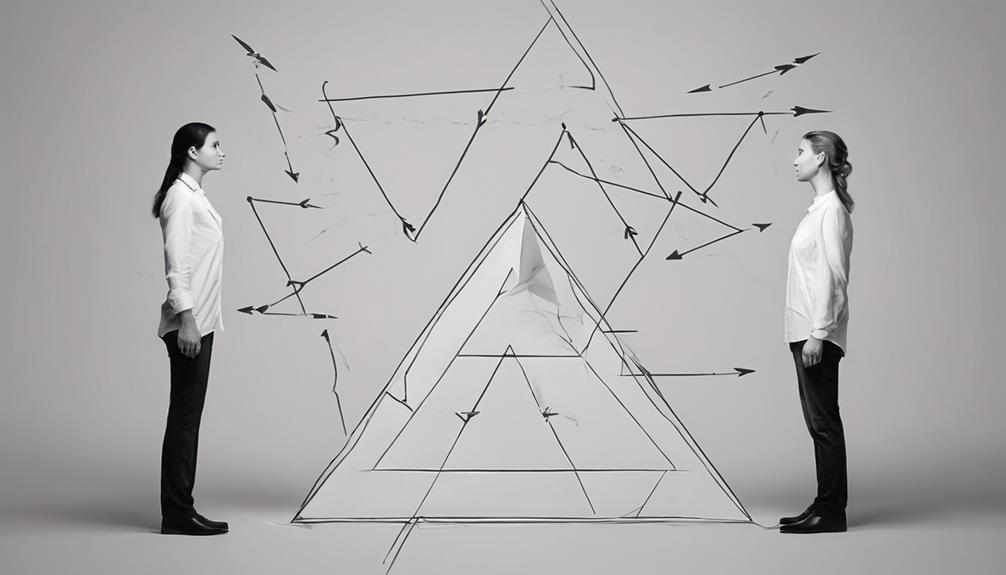Despite our desire to think differently, it’s often the case that we overlook signs of unfaithfulness when we have strong feelings for a person. Yet, in interactions with a narcissist, distinguishing between honesty and manipulation can become unclear.
Understanding the subtle cues of potential cheating is crucial in protecting oneself from emotional harm. By recognizing behaviors like gaslighting, lack of empathy, and sudden changes in routine, we can start unraveling the intricate web of deceit that a narcissist may weave.
Stay tuned to uncover these telltale signs and empower yourself with knowledge to navigate such challenging situations effectively.
Key Takeaways
- Recognize gaslighting tactics and lack of empathy as red flags.
- Watch for projecting blame and denying accountability behaviors.
- Note sudden changes, secrecy, and loss of shared interests.
- Address concerns openly, set boundaries, and prioritize communication.
Gaslighting Tactics

Gaslighting tactics are insidious manipulation techniques used by cheating narcissists to distort reality and make their partner doubt their own perceptions and sanity. It's crucial to recognize these harmful behaviors to protect yourself from emotional harm.
If you find yourself constantly questioning your own memory or feeling like you're going crazy, it may be a red flag that gaslighting is occurring in your relationship.
Lack of Empathy

Navigating a relationship with a cheating narcissist often unveils a glaring characteristic that can be deeply troubling: their lack of empathy. When faced with this lack of understanding and compassion, it can be challenging to maintain a healthy emotional connection. Here are three signs to help identify this troubling behavior:
- Disregard for Your Feelings: A cheating narcissist may dismiss or belittle your emotions, making you feel unheard and invalidated.
- Self-Centered Focus: They often prioritize their own needs and desires above yours, showing little concern for how their actions affect you.
- Emotional Distance: You may notice a growing emotional gap as they become increasingly indifferent to your struggles, joys, and concerns.
Recognizing these signs is crucial in understanding the dynamics of your relationship. Remember, you deserve to be with someone who values your feelings and shows genuine empathy. If you find yourself constantly overlooked and undervalued, it may be time to reassess the health of your relationship.
Secretive Behavior

Amidst the complexities of a relationship with a cheating narcissist, one red flag that often emerges is their tendency towards secretive behavior. It can feel unsettling when your partner becomes more guarded about their whereabouts, phone, or activities. This secrecy may extend to sudden password changes, increased privacy settings, or unexplained absences. If you find yourself questioning their actions, it's essential to trust your instincts and address these concerns with compassion and openness.
Secretive behavior can create a rift in the trust that forms the foundation of any relationship. As we navigate this challenging situation, it's crucial to communicate openly and honestly with your partner. Express your feelings and observations calmly, giving them the opportunity to clarify any misunderstandings. Remember, setting healthy boundaries isn't only acceptable but necessary for your emotional well-being.
In times of uncertainty, seeking support from friends, family, or a therapist can provide clarity and guidance. Remember, you deserve to be in a relationship built on trust, transparency, and mutual respect.
Projecting Blame

When we notice a partner projecting blame onto us, it can be incredibly hurtful and confusing. They might shift responsibilities onto us, making us feel like we're the ones at fault.
It's important to recognize these signs and address them with care and honesty.
Shifting Responsibilities
In relationships with cheating narcissists, a common red flag is their tendency to shift responsibilities and project blame onto their partners or others. This behavior can be emotionally draining and confusing for those involved. Here are three signs to watch out for:
- Avoiding Accountability: The narcissist consistently evades taking responsibility for their actions, making excuses or deflecting blame onto others.
- Gaslighting Tactics: They may manipulate the truth, causing their partners to doubt their own perceptions and feelings, ultimately making them feel like they're the ones at fault.
- Creating Drama: The narcissist may stir up unnecessary conflicts or create chaos to divert attention from their infidelities, leaving their partner feeling overwhelmed and at fault for the relationship issues.
Denying Accountability
As we delve deeper into the behavior of cheating narcissists, one significant aspect that emerges is their tendency to deny accountability by projecting blame onto others, particularly their partners. When a narcissist is cheating, they often refuse to take responsibility for their actions and instead shift the blame onto their significant other.
This behavior can be incredibly damaging and hurtful, leaving the betrayed partner feeling confused, guilty, and questioning their own worth. It's important for those in relationships with narcissists to recognize this pattern of denying accountability and seek support to navigate through the emotional turmoil it can bring.
Devaluing Your Feelings

Have you ever felt like your emotions were dismissed or belittled by someone you trusted? It can be incredibly hurtful and confusing when someone devalues your feelings, especially in a relationship.
Here are three signs that may indicate your partner is devaluing your emotions:
- Invalidating Your Feelings: If your partner consistently tells you that your emotions are unwarranted or irrational, it may be a sign of devaluation. Your feelings are valid, and it's important to have them acknowledged and respected.
- Minimizing Your Emotions: When your partner downplays the significance of your feelings or makes you feel like you're overreacting, it can lead to self-doubt and a sense of isolation. Your emotions matter, and they deserve to be taken seriously.
- Turning the Focus Back on Themselves: A narcissistic partner may constantly shift the conversation to focus on their own emotions and needs, leaving you feeling unheard and unimportant. Healthy relationships involve mutual respect and consideration for each other's feelings.
Triangulation With Others

Navigating a relationship where your partner engages in triangulation with others can be emotionally draining and confusing. Triangulation is a manipulative tactic where the narcissist involves a third party to validate their perspective or create jealousy, often leaving you feeling isolated and doubtful of your own reality. This can lead to a cycle of emotional turmoil, making it challenging to trust your own instincts and judgment.
| Signs of Triangulation | Effects on You | What You Can Do |
|---|---|---|
| Your partner frequently compares you to others or brings up ex-partners in conversations. | Feelings of insecurity and inadequacy, questioning your worth in the relationship. | Have an open and honest conversation with your partner about how their behavior makes you feel. Seek support from a trusted friend or therapist to validate your emotions. |
| Your partner often speaks highly of someone else in a way that undermines your achievements or qualities. | Decreased self-esteem and self-worth, leading to self-doubt. | Focus on building your self-confidence and setting boundaries with your partner. Surround yourself with positive influences that uplift and support you. |
| Your partner uses others to manipulate situations or gaslight you by making you doubt your perceptions. | Confusion and mental anguish, feeling like you're constantly on edge or walking on eggshells. | Trust your intuition and seek clarity by journaling your thoughts and feelings. Establish clear communication with your partner and assert your needs in the relationship. |
Sudden Changes in Routine

Experiencing sudden changes in your partner's routine can be unsettling and may raise concerns about their behavior and intentions in the relationship. It's natural to feel worried when the familiar patterns you've come to rely on start shifting unexpectedly. Here are three key signs to watch for that may indicate your partner is cheating:
- Unexplained Absences: If your partner is frequently absent without a valid reason or is vague about their whereabouts, it could be a red flag. Pay attention to any discrepancies in their schedule or unaccounted-for blocks of time.
- Increased Secrecy: Noticeable changes in how your partner handles their phone, suddenly using passwords or keeping it face down, can signal they're hiding something. Trust your instincts if you feel they're becoming more secretive.
- Different Interests: If your partner suddenly loses interest in shared activities or seems preoccupied with new hobbies or friends, it could be a sign of a shift in priorities. Open communication about these changes is crucial to understand what's happening in your relationship.
Frequently Asked Questions
How Can I Confront a Narcissist About Their Cheating Behavior Without Triggering Their Gaslighting Tactics?
Confronting a narcissist about cheating without triggering gaslighting tactics can be tricky. We must approach them calmly, armed with evidence and clarity.
Express our feelings directly, using 'I' statements to avoid blame-shifting. Setting boundaries is crucial; assertively communicate our expectations.
Stay firm and composed, seeking support from trusted individuals if needed. Remember, our well-being comes first, so prioritize self-care throughout this challenging process.
Why Do Narcissists Lack Empathy Towards Their Partners When Cheating?
When narcissists cheat, they often lack empathy towards their partners due to their self-centered nature. They prioritize their own desires and needs above all else, making it difficult for them to consider how their actions may hurt others.
This lack of empathy allows them to justify their behavior and avoid feeling guilt or remorse. Understanding this can help us navigate challenging situations with narcissistic partners and protect our own well-being.
What Are Some Red Flags of Secretive Behavior That May Indicate a Narcissist Is Cheating?
When we notice secretive behavior in a partner, it can stir up feelings of uncertainty and anxiety. Understanding these signs can be crucial in navigating a challenging situation.
It's vital to pay attention to sudden changes in communication patterns, unexplained absences, or a heightened sense of defensiveness. These behaviors might indicate a deeper issue that needs to be addressed with care and understanding.
Trust your instincts and seek support if needed.
How Can I Prevent a Narcissist From Projecting Blame Onto Me for Their Cheating Actions?
We understand how challenging it can be to prevent a narcissist from shifting blame onto us for their infidelity.
It's crucial to set boundaries and assertively communicate your feelings. Stay grounded in your truth and seek support from trusted friends or a therapist.
Is It Common for a Narcissist to Devalue Their Partner's Feelings While Engaging in Infidelity?
Absolutely, it's sadly common for a narcissist to devalue their partner's feelings while cheating. They often prioritize their own desires over the emotional wellbeing of their partner, leading to hurt and confusion.
It's crucial to recognize this behavior and prioritize your own self-care in such situations. Remember, you deserve respect and honesty in a relationship, and it's not your fault if a narcissist fails to provide that.
Conclusion
As we navigate the treacherous waters of a relationship with a narcissist, it's crucial to pay attention to the signs of infidelity. By recognizing gaslighting tactics, lack of empathy, secretive behavior, blame-shifting, devaluation of feelings, triangulation with others, and sudden changes in routine, we arm ourselves with knowledge and power.
Trust your instincts and remember, just as a lighthouse guides ships safely to shore, your intuition will guide you through the stormy seas of deception. Stay strong and stay true to yourself.
Emmeline is the backbone of our content creation team, bringing complex psychological concepts to life with clarity and empathy. As our Expert Writer, she crafts engaging, insightful articles that guide readers through the intricacies of personality assessments and what they reveal about the human condition. Her passion for psychology and personal development shines through in every piece she writes.










